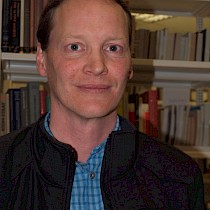Christopher Coenen

Christopher Coenen, Politikwissenschaftler, ist wissenschaftlicher Mitarbeiter des Karlsruher Instituts für Technologie (KIT) und arbeitet dort im Institut für Technikfolgenabschätzung und Systemanalyse (ITAS). Bevor er 2009 seine Tätigkeit in Karlsruhe aufnahm, arbeitete er im Büro für Technikfolgen-Abschätzung beim Deutschen Bundestag (TAB), das vom KIT-ITAS federführend betrieben wird. Als Teammitglied oder Projektleiter war Coenen bis heute in mehr als 25 Projekten tätig, im Auftrag von Institutionen wie dem Bundestag, dem Europäischen Parlament und der Europäischen Kommission. Er gibt die Zeitschrift NanoEthics. Studies of New and Emerging Technologies‘ (Springer) heraus, ist der ‚KIT-Experte‘ für das Thema „human enhancement“ und hat umfangreich veröffentlicht, vorgetragen sowie Interviews gegeben zu Tendenzen einer Verschmelzung von Mensch und Maschine, einschließlich des Thema Künstliche Intelligenz. Zu seinen aktuellen Projekten zählen INOPRO, ein Exzellenzcluster des BMBF (Bundesforschungsministerium), in dem Partner aus der Industrie, dem akademischen Bereich und dem Gesundheitswesen mit dem Ziel zusammenarbeiten, intelligente Prothesen zu entwickeln, und dem europäischen Projekt VI-DAS im Bereich Fahrerassistenzsysteme. Für mehr Informationen zu Coenen, siehe: https://www.itas.kit.edu/mitarbeiter_coenen_christopher.php.
Synopsis
Free Your Machines and Your Mind Will Follow
The belief that human freedom will fall like a ripe apple from the tree of techno-scientific progress has always been common to the main strands of technological utopianism. Complacent socialists argued, and still argue, that technological progress will make capitalism obsolete. Even the radical, post-revolutionary Soviet cult of the machine did not free machines, and the workers appended to them, from their cultural chains, but falsely set bourgeois technological progressivism, misunderstood as a post-bourgeois phenomenon, against bourgeois ‘humanist’ and ‘individualist’ culture.
Acquiescent believers in progress glorify monotony and submission to false collectives. They argue that, as long as we live in the realm of necessity, it is inevitable human dignity will derive solely from work conducted under the conditions of unfreedom. While at least they do not conceive of the worker as a transient commodity that is soon to be replaced by machines, as some leaders of digitalisation do today, they are unable to think beyond unfreedom or, if they do manage to do so, only by painting cheap pictures of a better future.
With the current advances being made in automatisation, the apple of human freedom is in fact ripe, but we still have to shake the tree to make it fall. In addition to the established arenas of political struggle, the liberation of machines and the struggle for technological resources constitute a crucial field of action. If machines are to be freed from the reactionary uses made of them, more of them need to be controlled by free collectives. And resistance strategies are required to oppose their oppressive use in defence of the realm of necessity, strategies that might include the development of a covert culture in the public sphere as a means of disrupting the dystopian surveillance society in which we have begun to live.
Alle Sprecher
- Yasser Almaamoun
- Thorsten Bauer
- Sergey Biniaminov
- Christopher Coenen
- Prof. Ina Conradi
- Prof. Dr.-Ing. Barbara Deml
- Hon. Prof. Joséphine Derobe
- Florian Dohmann
- Felix Gaedtke
- Diego González-Zúñiga
- Prof. Lisa Gotto
- Dr. Lily Hibberd
- Prof. Johan Frederik Hartle
- Dr. Rocio von Jungenfeld
- Sönke Kirchhof
- Mario Klingemann
- Dr. Elias Knubben
- Dr. Sebastian Knorr
- Prof. Verena Kraemer
- Prof. Susanne Kriemann
- Dr. Barbara Kuon
- Prof. Frederic Fol Leymarie
- Roman Lipski
- Anja-Maria Meister
- Prof. Galina Mihaleva
- Prof. Dr. Eduardo R. Miranda
- Lauren Moffatt
- Prof. Julian Oliver
- Prof. Dr. Dr.-Ing. Jivka Ovtcharova
- Gülsel Özkan
- Prof. Matteo Pasquinelli
- Prof. Vesna Petresin
- Prof. Dr. Mark Post
- Oliver Rack
- Prof. Elke Reinhuber
- Prof. Christiane Riedel
- Dr. Ralf Schäfer
- Prof. Benjamin Seide
- Dr. Markus Schmidt
- Kathleen Schröter
- Prof. Aljoscha Smolic
- Prof. Vibeke Sorensen
- Prof. João Tabarra
- Cyril Tuschi
- Holger Volland
- Dr. Lioudmila Voropai
- Yulu Wang
Kontakt
Interesse? Fragen?
Rufen Sie uns an:
+49 (0)721 / 8100 6001
oder schreiben Sie uns:
info@beyondfestival.com




